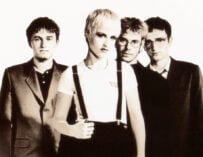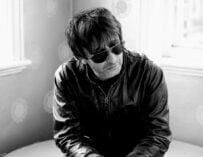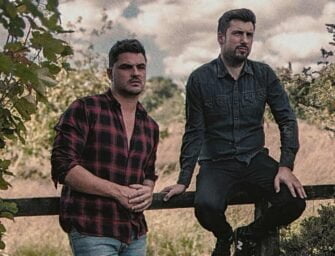
Alphaville in 1984. “It’s a fictitious story about a pair of lovers that are trying to get away from the drugs…” Pic: Thomas Reutter
A synth-rock anthem inspired by Berlin’s heroin scene, we learn all about a classic 80s track with a surprising origin
This year marks the 35th anniversary of Forever Young, the debut album by German synth-rock masters Alphaville. Backed by huge singles such as Big In Japan, Forever Young and Jet Set, the trio of Marian Gold, Bernhard Lloyd and Frank Mertens flew out the traps to launch a career which has endured to this day. Such is the album’s appeal that the band will soon be touring across Europe to celebrate Forever Young’s coral year.
Of all Alphaville’s tracks, it’s Big In Japan which has been their most successful. Topping the charts in their homeland, it made a similar splash across Europe as well as cracking the Billboard Hot 100 across the pond. It might surprise people to learn that this 80s power anthem has quite a dark origin.
It’s over to Marian and Bernhard for the full story…

Released: 12 January 1984
Artist: Alphaville
Label: WEA
Songwriter(s): Bernhard Lloyd, Marian Gold, Frank Mertens
Producer(s): Orlando (Wolfgang Loos)
UK chart position: 8
US chart position: 66
Marian: “We had this new Roland System 100M and it had two oscillators, a sequencer and an arpeggiator, which was inside this device. We created the bassline and I really liked it because we now had a device that could play polyphonic chords, but because of the two oscillators, this bassline gave you the imagination of chords.
“At the same time, I was thinking about writing the lyric for the song. I had an appointment with my dentist and I had this rhythm of the bassline in my mind as I was walking along. I created a lot of the verses for Big In Japan on my way to that dentist. I had a couple of friends and we were living under very serious conditions in West Berlin at that time, basically living on the street and some of our friends were drug addicts. They lived in the heroin scene around the Berlin Zoo and I started to write about them. This song is about that drug scene in the late 70s. It’s a fictitious story about a pair of lovers that are trying to get away from the drugs but they never succeed, they imagine themselves in a kind of dreamland where they are drug-free, but they never succeed in getting there and it’s quite a tragic story.”
Bernhard: “Marian always had the basic musical ideas, this rhythm that goes through the whole song but then in the middle of the song the chord changes and goes in double-time. When the song first was written the drum rhythm was also double-time, so much faster than you know it. When we did a serious demo for the production we decided to go for this half-time rhythm because at that time I was a DJ in a small club and was playing Safety Dance by Men Without Hats. I thought this actually could fit with Big in Japan as well, and so we changed the rhythm and found two matching melodies for the song.”
Marian: “Frank (Mertens) also played an important role. He was responsible for some of the melody of the song, so it was a collaboration between the three of us. At this time we had a small home studio, we had moved from Berlin to a provincial town. We had a studio in the basement and we had all this equipment that we needed like the Korg sequencer…”
Bernard: “…Small plastic boxes which did the job.”
Marian: “Big In Japan was just one of the many songs that we had written at that time. We knew that there was something special about the song but it was not very concrete, it was not very clear for us. Later on, when we released the song, everyone said, ‘This must be a hit,’ but for us it was just one of the songs that we had. But they were right.

Alphaville performing live in 2005. Photo: Wikimedia Commons
“It is very catchy and it is a very lucky coincidence of a few really good ideas: the intro, the bassline, and the refrain, it’s all very catchy and people can memorise the song quite easily. You can analyse it like this, but there’s something magical about every good song which is unexplainable.
“That line about being big in Japan has been misinterpreted by all sorts of people who like the song. That line has a certain meaning. It means that if you’re a complete loser, you’re telling other people, ‘I’m not a loser because in Japan I’m really big.’ It’s the lie of the loser and it fitted perfectly into the story of these junkies, which the song is about, in a very tragic way.
“The funny thing is I got this line from an English band called Big In Japan, a Liverpudlian band. I bought this record of theirs before we wrote the song and when I was writing the lyric I remembered it and the name of this band and thought, ‘Wow this is great.’ It fitted perfectly with the story and rhythmically it went very nicely into the chorus.
“When we finally released the song a couple of years later in 1984 we really rushed into the German charts and within six weeks it was at No 2. At No 1 was Frankie Goes To Hollywood with Relax and we were struggling hard to be No 1 and, finally, we achieved that. The singer of Frankie Goes To Hollywood, Holly Johnson, was originally in the band Big In Japan. It was just a very bizarre coincidence at the top of the German charts.
“We have a couple of really successful songs and we don’t have a problem playing them when we perform. It’s fantastic to have a couple of hits in your pocket. You can structure the setlist around them. It still feels great to play the song and interpret it in completely different ways. On the upcoming tour, celebrating the 35th anniversary of our first album, we’re probably going to return to the original version but, for the last couple of years, we’ve played a heavy metal version which was also nice.
“I don’t know what happened to our friends, because we lost contact after I left Berlin when we went to Münster. I wasn’t very interested in keeping up contact because I just wanted to get out of that scene and wanted to get away from the drugs. Doing that probably saved my life.”
Interview: Duncan Haskell









![Songwriting Credits… best new music playlist [September 2023]](https://www.songwritingmagazine.co.uk/wp-content/uploads/songwriting-credits-september-2023-335x256.jpg)






























Related Articles